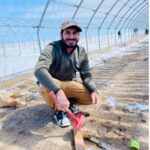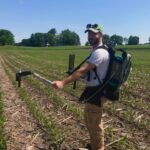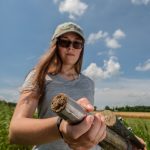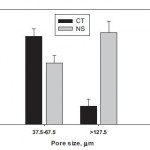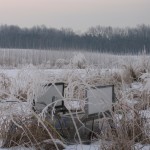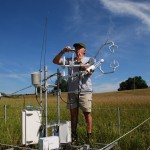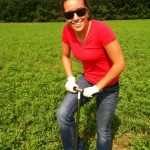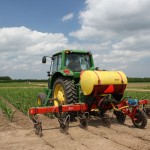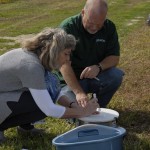Goutham Thotakuri is a graduate student in the Kravchenko lab at Michigan State University. His research is focused on the study of carbon transfer between various cover crop species and soil carbon sequestration. Recent changes to our climate dynamics have brought on alarming drought conditions in many parts of the world. Since we cannot control the climate, we need to prepare our agricultural systems for adversity. One way to do this is through understanding the soil's hydro-physical and biochemical processes. We can identify critical factors influencing drought resilience by
Measuring and predicting soil carbon to offset climate change
KBS Long-Term Ecological Research scientists awarded a $3.4 million grant from the U.S. Department of Agriculture’s Farm Service Agency to study possible climate outcomes. When an unproductive swath of farmland is planted with row crops, it results in environmental damage with little to no yield. Instead, farmers can cultivate native plants in those spaces that improve soil health and support other native species. The USDA Conservation Reserve Program, or CRP, offers them financial incentives to do just that. Measuring soil carbon for improved soil health Now, Michigan State
Global warming impacts of intensively managed agricultural landscapes in SW Michigan: Reflections from an LTER Fellow
Graduate researcher, Pietro Sciusco, is a Ph.D. candidate in the Landscape Ecology and Ecosystem Science-LEES Lab at Michigan State University. His research interest is to estimate ecological processes and their contribution to climate change in highly managed agricultural landscapes in southwestern Michigan. This is primarily through satellite data (i.e., multi-source imaging, optical and radar) and ground measurements. There is strong scientific evidence that human activities, such as burning fossil fuels and industrial processes, are the major driver of climate change since the
A peek at life under a wheat field: Reflections from an LTER Fellow
MSU graduate researcher, Allison Zahorec, is a PhD student in Dr. Doug Landis’s lab in the Department of Entomology at Michigan State University. When one envisions a typical midwestern farm, ‘biodiversity’ is hardly the first thing that comes to mind. Compared to more natural landscapes, agricultural lands can seem like ecological dead zones. Yet even the most intensively managed corn monocultures are teeming with life belowground. A few teaspoons of soil can contain over a billion individual organisms (largely microbes), and the diversity of soil-dwelling organisms is just as
Mapping the soil aggregate highway: Reflections from an LTER fellow
Each year the KBS LTER program awards two graduate students with summer research fellowships. Here Michelle Quigley describes the research her 2015 summer fellowship supported. Michelle is a Ph.D. student in Sasha Kravchenko's lab at Michigan State University. When most people think of studying soils in agricultural systems, they picture someone out in a field taking soil samples or surveying crops or in a lab running samples. That is fairly typical for most soil scientists. However, while I do get out in the field, most of my time is spent staring at a computer screen. Carbon is
The ‘not so slow’ days of winter at the KBS LTER
By: Sarah L. Hanks, KBS LTER Outreach Team Many folks tend to think that winter is a time of rest and recuperation for farmers and agricultural researchers and professionals. The KBS LTER team would suggest that this could not be further from the truth. Just because there is snow falling and the ground is frozen does not mean that there is time to relax. After talking with Stacey VanderWulp, LTER Project Manager, and Kevin Kahmark, LTER Research Assistant, I found out just how busy things are around the KBS LTER during these cold months. Hundreds of plant samples are collected, by
Generosity of local farmer creates national impact
Harold and Edythe Marshall’s gift of their 300-acre farm to Michigan State University has been a major boon to understanding the ecology of new biofuel crops, producing research results with national impact by scientists at MSU's Kellogg Biological Station (KBS). Under a unique partnership between the Marshalls and MSU, the farmland east of Hickory Corners in Barry County is enabling scientists from the KBS Long-term Ecological Research (LTER) program and the Great Lakes Bioenergy Research Center (GLBRC) to conduct unique biofuel research with funding from the US Department of Energy
Soil is life – let’s keep it healthy! Reflections from an undergrad researcher
Each summer the KBS LTER supports students to participate in the Research Experiences for Undergraduates (REU) program, funded by the National Science Foundation. This is part of a larger undergraduate research program at KBS. Alessandra Zuniga, a senior at New Mexico State University, writes about her REU experience working with KBS LTER scientists Christine Sprunger and Brendan O'Neill. Coming from the hot arid deserts of the southwest, I never expected to find myself in the middle of lush green Michigan. I was born and raised in the city of Las Cruces, New Mexico and had the privilege to
Fertilizing to help the planet
This news piece by KBS LTER volunteer and retired journalist Bill Krasean. Researchers at Michigan State University's Kellogg Biological Station (KBS) Long-term Ecological Research (LTER) program have helped develop a way for farmers to reduce crop-related emissions of a greenhouse gas while potentially lowering fertilizer costs, maintaining crop yields, and getting paid to do so. KBS scientists have developed a program to reduce farm-related emissions of nitrous oxide (N2O), a potent greenhouse gas that also destroys ozone in the stratosphere. Using data collected from Michigan farms,
KBS LTER participates in Carbon, Energy and Climate Conference
Last fall, the KBS LTER had an exciting opportunity to collaborate with the North Central Region Sustainable Agriculture Research and Education, or NCR-SARE, program to address issues related to agriculture and global change. An extensive, 2 ½ day Carbon, Energy and Climate Conference was held on September 26-28, 2012 at the W.K. Kellogg Biological Station (KBS). NCR-SARE is organizing a two-year professional development and training initiative around carbon, climate and energy issues, and September’s conference launched the initiative. One-hundred and thirty-three speakers and participants
